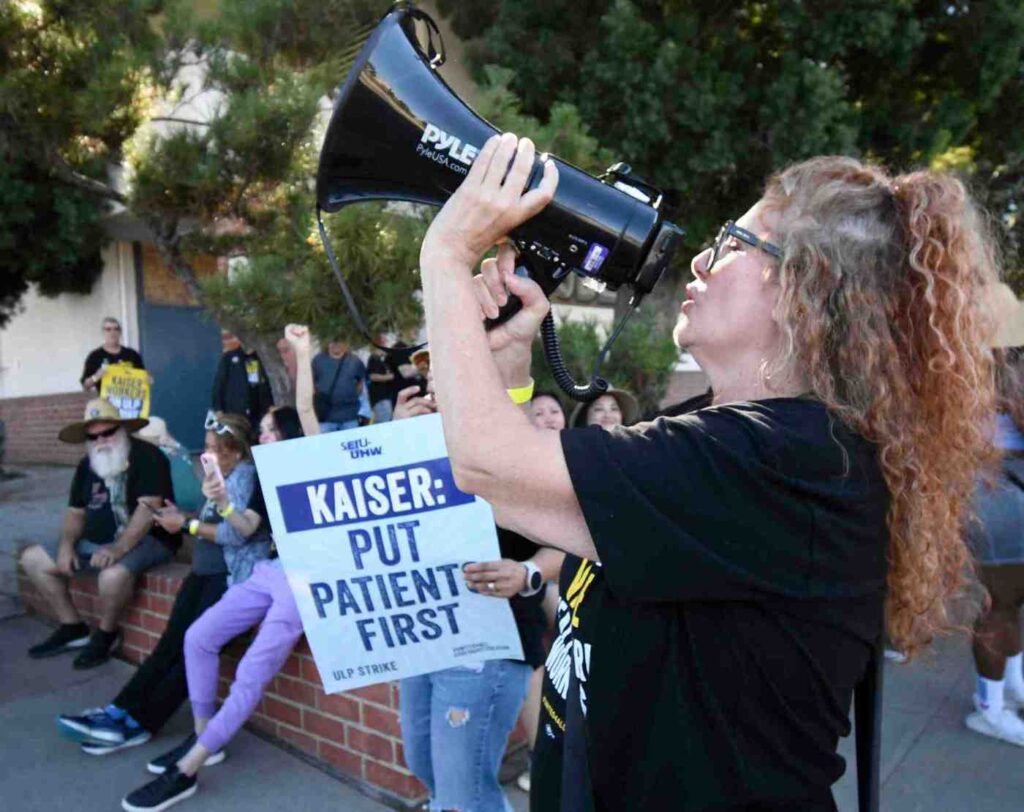
Executives at Kaiser Permanente have received notice of another potential strike just days after 75,000 employees ended a three-day walkout.
The Coalition of Kaiser Permanente Unions issued a 10-day strike notice Monday, Oct. 9, warning of a possible strike Nov. 1-8 if the healthcare giant fails to address “an acute and dire” staffing crisis and continues to outsource jobs.
Union contracts expired Sept. 30 and bargaining between the two sides is set to resume Thursday, Oct. 12 and Friday, Oct. 13.
Frontline healthcare workers say they’ll wait until Nov. 1 for any potential strike action, when an additional contract covering workers in Seattle expires. The delay is intended to give Kaiser executives more time to craft viable proposals.
The Seattle contract’s expiration Oct. 31 would enable another 3,000 healthcare workers also affected by the Kaiser short-staffing crisis to join strike lines.
In a statement issued Tuesday, Kaiser said it is “committed to reaching an agreement that is good for our employees, our members and our organization,” adding that it “will continue to bargain in good faith with the coalition.”
Kaiser said it will keep all hospitals and emergency departments open. It operates three dozen hospitals and more than 500 medical offices throughout California.
The unions say outsourcing has emerged as a major sticking point in negotiations, as Kaiser executives have refused to place limitations on subcontracting and outsourcing. Limits would keep experienced healthcare workers on the job, the unions contend, providing continuity of care for patients.
Caroline Lucas, the coalition’s executive director, said Kaiser has failed to listen to employees who have long complained of being short-staffed and overworked — a situation that has led to burnout among workers and higher turnover.
“This week, Kaiser executives will have another opportunity to listen to frontline staff, to follow the law in formal discussions and to begin investing in ways that will solve the Kaiser short-staffing crisis,” Lucas said.
Jessica Cruz, a licensed vocational nurse at Kaiser Los Angeles Medical Center, said employees are stretched thin.
“I see my patients’ frustrations when I have to rush them and hurry on to my next patient,” Cruz said last week. “We’re burning ourselves out trying to do the jobs of two or three people, and our patients suffer.”
Kaiser workers say company executives have refused to adequately address the staffing crisis and place limitations on subcontracting and outsourcing. (File photo by Gene Blevins/contributing photographer)
Kaiser said it recently finished hiring 10,000 people, adding to the 51,000 workers the hospital system has brought aboard since 2022.
In regard to wages, Kaiser workers are asking for a $25 hourly minimum wage, as well as increases of 7% each year in the first two years and 6.25% each year in the two years afterward.
Kaiser, which turned a $2.1 billion profit for the quarter, has offered minimum wages of $23 an hour in California and $21 an hour elsewhere.
Last week’s walkout among nurses, ER techs, respiratory therapists, x-ray technicians and scores of others has been called the largest healthcare strike in U.S. history. It impacted operations at 23 Kaiser facilities in Southern California, along with others throughout Colorado, Oregon, southwest Washington, Virginia and Washington.
Workers say they hope to avoid another strike but are taking the legal steps necessary to prepare for that possibility.
Kaiser is not the only healthcare chain grappling with staffing issues.
An estimated 1,800 workers across four local Prime Healthcare facilities plan to wage a five-day strike Monday, Oct. 9, claiming management refuses to address unsafe working and patient-care conditions caused by a short-staffing crisis.
The unfair labor practices strike will affect operations at St. Francis Medical Center in Lynwood, Centinela Hospital Medical Center in Inglewood, Garden Grove Hospital and Medical Center and Encino Hospital Medical Center if the two sides fail to reach a labor agreement.
